

Yazhni
Part of PSY108, TMA01 An assignment on Reinforcement & Punishment This is a resource centre that 1. Explains what reinforcement and punishment are to parents & 2. How parents can use these to influence the behaviour of their teenage children.
How can parents utilize operant conditioning to influence behaviour of their teen children? Punishment & reinforcement. Operant conditioning. Learning: Negative Reinforcement vs. Punishment. Edward Thorndike - Law of Effect. By Dr.
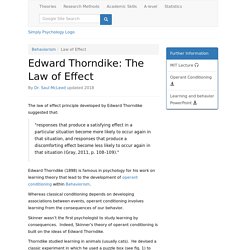
Saul McLeod updated 2018 The law of effect principle developed by Edward Thorndike suggested that: "responses that produce a satisfying effect in a particular situation become more likely to occur again in that situation, and responses that produce a discomforting effect become less likely to occur again in that situation (Gray, 2011, p. 108–109). " Edward Thorndike (1898) is famous in psychology for his work on learning theory that lead to the development of operant conditioning within Behaviorism. Whereas classical conditioning depends on developing associations between events, operant conditioning involves learning from the consequences of our behavior. Skinner wasn’t the first psychologist to study learning by consequences.
Thorndike studied learning in animals (usually cats). He placed a cat in the puzzle box, which was encourage to escape to reach a scrap of fish placed outside. Eventually they would stumble upon the lever which opened the cage. Skinner’s Operant Conditioning: Rewards & Punishments. Operant conditioning: Positive-and-negative reinforcement and punishment.
Operant Conditioning in Disney Movies. Types of Punishment. Types of Reinforcement. Objective of Conditioning (istudyguide) How to Train a Brain - Crash Course Psychology #11. Discipline strategies for teenagers. Teenage discipline: the basics Discipline isn’t about punishment.

It’s about teaching children appropriate ways to behave. For teenagers, discipline is about agreeing on and setting appropriate limits and helping them behave within those limits. When your child was younger, you probably used a range of discipline strategies to teach him the basics of good behaviour. Now your child is growing into a teenager, you can use limits and boundaries to help him learn independence, take responsibility for his behaviour and its outcomes, and solve problems. Your child needs these skills to become a young adult with her own standards for appropriate behaviour and respect for others. Teenagers don’t yet have all the skills they need to make all their own decisions, so the limits you agree on for behaviour are an important influence on your child. Teenage discipline is most effective when you: Negotiation is a key part of communicating with teenagers and can help avoid problems. Using Reinforcement and Punishment at Home. Reinforcement vs. Punishment: Changing Behavior.
Being a parent has been known as the best thing ever BUT also the most challenging endeavor you will encounter in your lifetime.
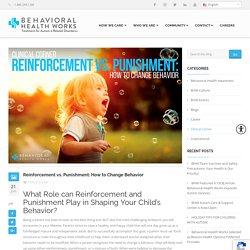
The Use of Reinforcement and Punishment in Shaping a Child's Behavior. Carrot or stick? Punishments may guide behavior more effectively than rewards. When it comes to rewards and punishments, which is more effective — the carrot or the stick?
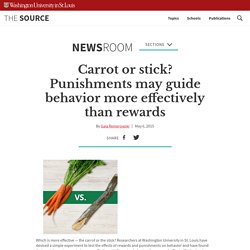
A simple experiment devised at Washington University in St. Louis suggests that punishments are more likely to influence behavior than rewards. The results, which stem from a study involving 88 students at the university, are available online in the journal Cognition. The study found that losses — or punishments — had a measured impact two to three times greater than gains — or rewards.
In one study group, students listened to a series of clicking noises and indicated whether they heard more clicks in the left or right ear. Every time a student made a choice, the researchers randomly displayed a token for 5, 10, 15, 20 or 25 cents that was given as a reward for the correct answer or taken away as a punishment for an incorrect response.
As might be expected, when a student was rewarded, he or she tended to repeat the previous choice. The study, performed in collaboration with Richard A. Parenting: Using Rewards and Punishments (Guide) Parenting can be a personal and a touchy subject.
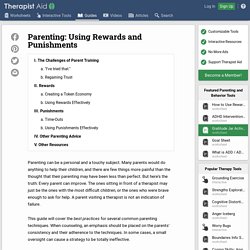
Many parents would do anything to help their children, and there are few things more painful than the thought that their parenting may have been less than perfect. But here's the truth: Every parent can improve. The ones sitting in front of a therapist may just be the ones with the most difficult children, or the ones who were brave enough to ask for help. A parent visiting a therapist is not an indication of failure. This guide will cover the best practices for several common parenting techniques. Most of the advice in this guide—unless noted otherwise—is effective for teenagers as well as younger children. The Challenges of Parent Training "I've tried that. " Before asking for help, most parents have tried it all. Negative Reinforcement and Operant Conditioning. Did you know that parents could train their children to act defiant?
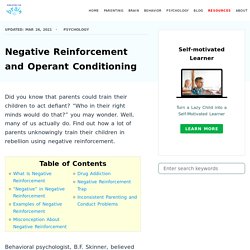
“Who in their right minds would do that?” You may wonder. Well, many of us actually do. Find out how a lot of parents unknowingly train their children in rebellion using negative reinforcement. Behavioral psychologist, B.F. In operant learning, the operant behavior is “controlled” by its consequences2. Rewarding behavior is key to parenting teens, study suggests. Parenting is hard, and parenting teens brings about an entirely new set of challenges, from keeping their rooms clean to getting them home before curfew.

But, a new study suggests parents who want their teenagers to keep their grades up could have better success if they focus more on rewarding good behavior and less on threatening to punish the bad. According to the report, published in PLOS Computational Biology, British researchers have found that adolescents focus well on positive incentives, but have difficulty staying motivated to avoid penalties. The study shows that teens and adults learn in different ways, according to the study’s lead author Stefano Palminteri, a researcher with the Institute of Cognitive Neuroscience at University College London.
Positive Reinforcement - Tips for teaching and parenting. Reinforcement vs Punishment Psychology [Examples] Reinforcement and punishment are often used as parenting tools to modify children’s behavior.
![Reinforcement vs Punishment Psychology [Examples]](http://cdn.pearltrees.com/s/pic/th/reinforcement-punishment-183049524)
Let’s review the difference between positive reinforcement and negative reinforcement, and the difference in outcomes between them. The Difference Between Positive And Negative Reinforcement In behavioral psychology, reinforcement is the introduction of a favorable condition that will make the desired behavior more likely to happen, continue or strengthen in the future1. Parenting Styles - Types of Parenting Styles. Once you have a child and start getting to know other families, you quickly learn one thing: Every parent and kid is unique — and there’s no one-size-fits-all approach to raising and caring for a little one.
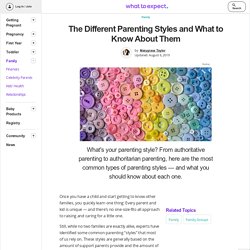
Still, while no two families are exactly alike, experts have identified some common parenting “styles” that most of us rely on. These styles are generally based on the amount of support parents provide and the amount of control they try to exert. Parenting Styles and Their Effects on Children.